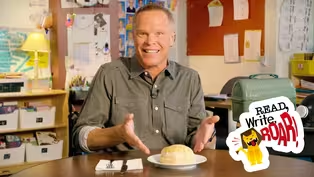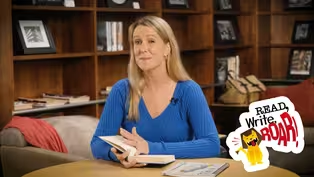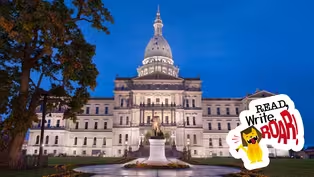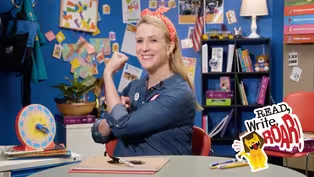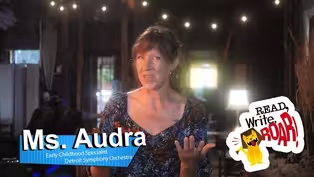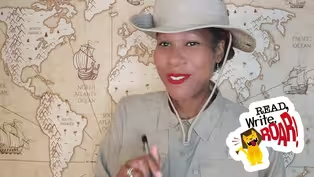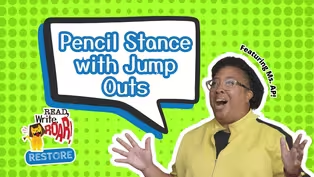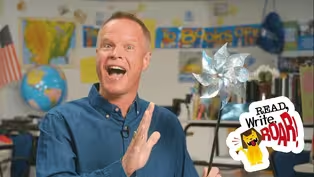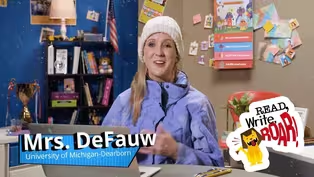Read, Write, ROAR!
What's Up With the Weather? - Michigan's Climate
Season 1 Episode 1003 | 26m 46sVideo has Closed Captions
Learn all about Michigan's climate.
Learn all about Michigan's climate. First, take a look at what causes lake effect snow. Then, what makes wind power work for Michigan?
Problems playing video? | Closed Captioning Feedback
Problems playing video? | Closed Captioning Feedback
Read, Write, ROAR! is a local public television program presented by Detroit PBS
Read, Write, ROAR!
What's Up With the Weather? - Michigan's Climate
Season 1 Episode 1003 | 26m 46sVideo has Closed Captions
Learn all about Michigan's climate. First, take a look at what causes lake effect snow. Then, what makes wind power work for Michigan?
Problems playing video? | Closed Captioning Feedback
How to Watch Read, Write, ROAR!
Read, Write, ROAR! is available to stream on pbs.org and the free PBS App, available on iPhone, Apple TV, Android TV, Android smartphones, Amazon Fire TV, Amazon Fire Tablet, Roku, Samsung Smart TV, and Vizio.
Providing Support for PBS.org
Learn Moreabout PBS online sponsorshipMore from This Collection
Learn the literacy skills every 4th and 5th grader needs while exploring what makes Michigan unique.
Tasty Michigan Treats - Michigan's Unique Foods and Snacks
Video has Closed Captions
Learn about Michigan's magical foods! (26m 45s)
Let's Talk Together - Michigan's Languages
Video has Closed Captions
Learn all about languages you might hear in Michigan! (26m 46s)
Making Michigan - Lessons in Michigan History
Video has Closed Captions
Take a dive into the history of Michigan. (26m 45s)
Video has Closed Captions
Learn how to use multiple sources and how narrative text works! (26m 46s)
Providing Support for PBS.org
Learn Moreabout PBS online sponsorship- Hey learners.
Welcome to "Read, Write, Roar!"
What's up with the weather?
We're going to take a look at Michigan's weather and what makes it unique.
We'll also learn some of the skills we need to be successful learners.
Let's go "Read, Write, Roar!"
- [Narrator] This program is made possible in part by the state of Michigan (upbeat music) and by (upbeat music) and by viewers like you.
Thank you.
(upbeat music) - Have you ever experienced lake effect snow?
I sure have since I've lived in Michigan all my life.
I'm Mrs. DeFauw and I love our great lake state.
Even the snow, usually.
But what is lake effect anyway?
Lake effect snow is created when cold air blows over warm water.
As the great lake state, we often experience lake effect snow because of the five great lakes, which also means we usually experience a few extra snow days.
For this lesson, we will listen to a read aloud about a snow day and then respond to that read aloud, making connections to our lives.
We are also going to think about how to add in more dialogue to make our stories come alive.
The spoken words are the dialogue.
Whenever a character speaks, we see quotation marks around words, which tells us when dialogue is taking place.
I think of this as a smiley face with dimples.
Whatever is spoken is framed with quotation marks.
"Slippery Snow Day Surprise."
Late for school one morning, Jade raced for the door.
"Hurry, Emmett!"
Emmett zipped around the corner, scrambling to pull on his warm hat and gloves.
"I'm right behind you."
The cold Michigan's winter wind whipped all around them as they trudged to the bus stop, their footprints following them in the snow.
The headlight beams from different vehicles creeped along the dark, slippery road.
"I can't believe we have school today," Emmett said, tucking his chin into his coat.
Jade's teeth chattered so much she couldn't respond with words.
She opened her eyes wide to show Emmett she agreed.
In the distance, they saw the school bus inching along the road.
As the bus tried to stop in front of them, its yellow lights turning to red, the bus slipped right past them.
"Oh, no!"
Jade said.
"What do we do?"
Just then, the school bus driver opened the door.
Jade and Emmett tried to step toward the bus, but stop when they heard the school bus driver shout, "Go back home!"
"No school today!"
"They just called it!"
Jade and Emmett stood there for a moment like frozen snow statues.
Their eyes filled with surprise and they yelled, "Snow day!"
I wonder what this story made you think about.
Is there a special snowy memory that means so much to you?
I'm going to model for you how this story makes me think about a special snow day with my family.
Today I'm using my computer to write the words.
Feel free to use pencil and paper instead if that works better for you.
For me, this story reminds me of my three children and our most recent snow day.
I love remembering what they said in the moment, so I plan on adding a lot of dialogue.
Just like in the story we read, in my story, whenever a character speaks, I am going to put those words in quotation mark.
When the phone rang, I recognized the school district's phone number immediately.
I turned on the speaker so Drew could hear the message too.
"A snow day!"
Drew squealed.
"Go tell your sisters," I said with a smile.
Drew raced up the stairs like a mountain goat, every step loud and thundering, as he yelled, "DeLainey!
Dayana!
Stop getting ready."
As I walked into the girls' bedrooms, snow day smiles plastered their faces, which matched mine and Drew's perfectly.
Now it's your turn.
I invite you and anyone you're with to write a memory that connects to weather related experiences.
What was said during your special memory?
If you can't remember exactly what was said, that's perfectly okay.
Writers are really good at inventing details.
When we choose to write, we need to see ourselves as not only writers but rewriters.
Think of it like a snowman.
When we write the first draft, it's adding the beginning, middle, and end, like the bottom, middle, and top parts of a snowman.
When we rewrite, we add extra details to make our writing come to life much like carrot noses sticks for arms, a hat, and scarf for extra details added to bring a snowman to life.
I want to highlight a writing trick that helps me add action to my dialogue.
The trick is a tiny word, as.
In my writing, I share dialogue and then couple it with as to add action.
This little trick helps me to add character action to my story so the reader can better visualize what's happening.
Let me show you.
When the phone rang, I recognized the school district's phone number immediately.
I turned on the speaker so Drew could hear the message too.
"A snow day!"
Drew squealed.
This is my first bit of dialogue.
I like my word choice.
Squealed shows how Drew said, "A snow day!"
Let's use as to add another detail.
I'm picturing what Drew was doing.
"A snow day!"
Drew squealed as he jumped up and down.
Now you try one.
In my story, I wrote, "Go tell your sisters," I said with a smile.
How could I revise this to add an action?
What would you put in the blank?
"Go tell your sisters," I said with a smile as, I raced Drew up the stairs.
As I gave Drew a wink.
As the snow billowed outside the window.
Great ideas, everyone.
Now take a look at your own writing.
Find a bit of dialogue in your writing and add as to show some action.
When you're done, reread your writing aloud to yourself.
How does this sound?
Will the extra details help the reader better create images of what's happening in your writing?
I think so.
Now that you've written and rewritten a special memory that connects with this story, please read aloud your writing to others.
Authors love an audience.
(upbeat music) - I'm Ms. AP here to help restore your energy.
Let's start with our warmup.
We are gonna be running in place by the count of 10.
Ready?
Go.
1, 2, 3, 4, 5, 6, 7, 8, 9, 10.
Good job, everyone.
Now that we've warmed up our bodies, we are ready to exercise.
Today we are gonna continue on moving our legs out and in, but this time instead of stepping, we are going to jump.
So get ready.
Let's stand up tall in our ready position.
Remember, stand tall like a pencil, arms are at our side, legs are together.
Once my body is in that ready position, I'm going to use both of my feet to jump out and once my feet land on the ground, I'm going to use both feet to jump back in.
Watch me as I start in the ready position.
Bend knees out, jump, bend knees in, jump in.
Now you'll try.
Jump out.
Stand in that ready position.
Jump in.
Ready like a pencil.
All right, let's try jumping 20 times together.
Ready?
Go.
1, 2, 3, 4, 5.
(upbeat music) 11, 12.
(upbeat music) 17, 18, 19, 20.
Give yourselves a big clap clap.
(Ms. AP clapping) Wow.
Nice job.
Let's start our cool down.
Breathe in and breathe out.
Breathe in and breathe out.
Great job.
(upbeat music) ♪ Know yourself, be so aware.
♪ ♪ Check your feeling, ♪ show you care ♪ ♪ Manage actions, ♪ keep your cool ♪ ♪ Reach your goals, ♪ follow the rules.
♪ ♪ See your friend, ♪ understand their view ♪ ♪ Share a smile, ♪ that's what we do ♪ ♪ Make good choices, ♪ think it through.
♪ ♪ Make good choices, ♪ think it through.
♪ (upbeat music) - Greetings, friends.
I'm Miss Yarnell, your 21st century skills coach.
What are 21st century skills?
21st century skills are the skills and knowledge you need to do well, be happy and keep learning in school and in life.
And today we're setting sail on an excited adventure to explore three superpowers, ethics, action, and accountability.
These might sound like grownup words, but they're important at every age.
Are you ready?
All aboard, future captains!
Ethics is like a set of rules or a set of principles that guide us in making right and wrong decisions.
It helps us be fair and kind to others and live our lives in a positive way.
This brings us to action.
Action is what you do every day, like speaking, helping and choosing how to behave.
Your actions show your ethics in real life.
It's like putting your inner rules about what is right into practice.
Now onto accountability.
Accountability is a fancy way of saying we own up to our actions.
It shows that you understand your actions are important and are ready to say, I did this when something goes wrong.
It's like being the captain of your ship, steering it wisely, using your ethics, and if you make a mistake, you fix it.
This shows others that you are honest and trustworthy and it helps you follow your ethical rules even better.
All right, friends is journal quest time.
Your mission, reflect on a time when you faced a choice between right and wrong.
For example, in fifth grade, I was in a store with friends and they dared me to steal candy from a store.
And because of peer pressure, I did it and was caught by the store manager.
I apologized, returned the candy and promised never to do it again.
Learning from this mistake, I realized the importance of honesty and standing up for what is right, even when it's hard.
That's my story, but I'm sure you have one too.
So write in your journals about a time you faced a choice between right and wrong.
Write about your decision, how it made you feel, and what you learned.
It's okay if things didn't turn out perfectly.
What's important is the lesson learned and how you will apply it moving forward.
Always remember practicing ethics, positive actions and accountability is important because it helps you be a good friend and a good person.
When you grow up, these practices will help you make even more significant decisions in a way that makes you proud and keeps others respecting and trusting you.
Thank you for spending this time with us.
Keep being your wonderful selves, making wise choices and doing what's right.
Until our next adventure, we will close with a song by Miss Melody Jones titled "Truthfulness."
(soft music) ♪ Truthfulness is being honest ♪ in your words and actions ♪ ♪ Don't listen to gossip, ♪ stereotypes or prejudice ♪ ♪ See the truth for yourself ♪ ♪ Don't try to be more than ♪ you are to impress others ♪ ♪ Be yourself.
♪ ♪ Your true self ♪ ♪ Truthfulness is brighter ♪ ♪ Brighter than the ♪ light of the sun ♪ (upbeat music) - Oh, hey there.
Have you ever played with one of these cool pinwheels?
Oh, watch this.
(upbeat music) Now imagine if we could use the wind to do more than just spin a pinwheel.
What if we could use it to make electricity to power our homes?
That's what wind power is all about.
Hi, I'm Mr. Peterson and I'm a big fan of wind power.
Get it?
I think renewable energy resources like wind power are super important for our state.
Today we're going to learn how to write about our opinion and we are going to learn about why wind power is great for Michigan.
To start things off, I'm going to need a source to back up my opinion.
So I found this source, "Why Wind Power is Great for Michigan."
I'm going to use this to help me write my opinion piece.
One thing we need to understand before we start reading about wind power is what a wind turbine is and how it works.
A wind turbine is a large machine that uses the power of the wind to create electricity.
It has big blades that look like giant fan blades.
When the wind blows, it makes these blades spin around and inside the turbine there is a machine called a generator.
The generator is filled with big coils of wire and magnets.
The blades from the wind turbine make the coils and magnets inside the generator spin around in a certain way, and this generates electricity.
This electricity then runs through wires and is used to power our homes, schools, and other buildings.
So you can think of a wind turbine as a giant pinwheel that produces energy.
While reading, I'm going to jot some notes in a graphic organizer to help me track the important points of the article to help me write my opinion essay.
Not only will this graphic organizer help me plan my writing, but it will also help support my understanding of the reading.
At the top of my organizer, I'm going to write my opinion about wind power in Michigan.
Wind is a great energy source for Michigan.
Now we're ready to read.
Wind power is an excellent energy source for Michigan, offering cost effectiveness, safety, minimal environmental impact, and social and economical advantages.
Cost effectiveness, renewable and free resources.
Wind is a natural renewable resource that is freely available.
Comparable production cost.
Producing electricity from wind is as cost-effective as natural gas.
Safety.
Health impacts.
There are no adverse health effects from living near wind turbines.
Wildlife impact.
Wind turbines account for less than 1% of bird deaths, posing minimal risk for wildlife.
Social and economic benefits.
Energy security.
Wind power allows Michigan to produce its own electricity.
Job creation.
The wind power industry creates jobs for engineers, construction workers and maintenance technicians.
Property values.
Studies show that wind turbines do not decrease property values.
Noise levels, minimum noise.
Wind turbines produce noise levels lower than common household appliances like refrigerators.
Now I'll use the graphic organizer to write an opinion essay.
You'll see that I use ideas from my graphic organizer when I'm writing, so I can write using my own words.
As I write, you will notice I am going to use sequencing words to support me as a writer, to organize my thoughts, but also to help readers to understand as they read.
Be on the lookout for these sequencing words.
My title is "Why Wind Power is Great for Michigan."
I believe wind is a great energy source for Michigan.
It has many benefits that make it an excellent choice for Michigan.
Let me tell you why.
First, wind power is very cost effective.
Wind is a free, natural and renewable resource.
This means we don't have to pay for fuel to generate electricity for wind.
The cost of producing electricity from wind is similar to the cost of using natural gas.
Second, wind turbines are safe.
Studies have shown that there are no health problems associated with living near wind turbines.
This means that families can live near wind farms without worrying about their health.
Wind turbines are not a great risk to wildlife.
Studies have shown that wind turbines cause very little interaction with wildlife.
Less than 1% of bird deaths are caused by wind turbines, which means they are safer options for animal friends compared to other human activities.
Next, wind power is good for everyone in Michigan.
It provides energy security because we can produce our own electricity without relying on other states or countries.
Wind power also creates jobs for people in Michigan, including engineers, construction workers, and maintenance technicians.
Wind turbines also do not make property values go down.
Research shows that having wind turbines nearby does not decrease the value of homes and properties so people don't have to worry about losing money.
Lastly, wind turbines do not create too much noise.
The sound level of wind turbines is below that of a refrigerator.
This means the noise from wind turbines is very low and does not disturb people living nearby.
In conclusion, wind power is a great energy source for Michigan.
It is cost-effective, safe, good for everyone and not too noisy.
This makes wind power an excellent choice.
By using wind power, we can make Michigan a better place for everyone.
And there you have it.
Now you know how to write an opinion essay with sequencing words.
Just remember to choose your opinion, do your research, plan your writing out with a graphic organizer and then write each part.
Words and wind are powerful, so let's use them.
(upbeat music) - Hello friends.
I'm Miss Audra, and today we're gonna create a soundscape for a river, for a walk by the river in the evening, all the different sounds you might hear whether your river is rushing or it's very quiet and trickling and what are the other sounds you might hear.
Crickets.
What's happening as you walk down that river.
So while we think about that, let's take a breath together and we're gonna take it.
Here we go.
(soft music) There we go.
(soft music) And then blow it out like the river today.
(teacher whooshing) And then one more together.
(soft music) (teacher inhaling) And hold.
(soft music) And blow it out rush, rush, rush.
Nice.
So think about all the sounds and we're gonna create a soundscape around the river.
So is your river raging?
Is it trickling?
Are there little creatures?
Are there ducks in your river?
Are you walking by and hearing just the breeze tickle the leaves?
What are you hearing?
So, and don't forget to use your hands or your arms and if you have space, your whole body, and on the count of three, we're gonna do it together.
I'm gonna listen and then I'm gonna add one, two, three, go.
(soft music) Oh, I love hearing all those beautiful sounds.
(soft music) And I'm gonna add my sound to now.
(teacher whooshing) And on the count of three we're gonna pause together.
One, two, three.
Wow, how beautiful all those sounds together.
We're creating a symphony of sounds, a soundscape for the river.
Let's end and say goodbye with a nice cleansing breath.
Just one more to steady ourselves.
Here we go.
(teacher inhaling) (soft music) Hold.
Blow out like the river.
(teacher whooshing) See you next time.
(upbeat music) - Hey there, it's Detective Meg and we've got some serious business to talk about.
A mystery of understanding the figurative language of idioms needs to be solved and needs your help.
The idiom is one of the trickier types of figurative language, but don't worry.
With our combined investigative skills, we will solve this mystery together.
First step in solving the mystery is to understand that its ends are usually common phrases, but if you break them apart into the individual words, the meaning will not be the same.
It keeps things interesting and is both tricky and exciting in our reading and writing.
You see, idioms are the wild card, a figurative language.
While similes and metaphors are figurative language that compare things, idioms are figurative language that are a fun way to talk about something that might even seem a bit silly.
If you're not careful, they might confuse you.
Take a simple sentence like read your book and study and turn it into hit the books.
Well, if you break apart the phrase, read your book and study, it looks something like this.
If you break apart, hit the books, it looks like this.
(book slamming shut) Now actually hitting your books is in the message here.
Instead, it's an idiom that means read your book.
So hit the books as an idiom.
Let's keep looking at idioms and practicing cracking the mystery of how to understand them and use them to make our writing more colorful and interesting.
See, there's one cookie left and it was supposed to go to Ryan the Lion, but somebody ate the cookie even before Ryan could.
Ryan's pretty upset, so we both separately try to solve a mystery of who ate that last cookie.
Eventually we investigate together, which helps us find clues faster.
I say two hoods are better than one.
This is an idiom and also a great lesson because working together to solve something is important and helpful.
Let's try break the ice.
Let's say that there's a new student at school.
They seem cool.
They even have the same shoes as you.
You wanna be friends with them, but you don't quite know how to approach them.
Then you see their shoelaces are untied, so you say, "Hey, your shoelaces are untied."
Hopefully they'll say, "Thanks."
From here, you can tell them that you have the same shoes.
This is a way to break the ice.
You're melting away the nervousness of making a new front like warmth melts away ice.
Alright, detectives, let's put all of our clues together now.
We use figurative language to keep our writing interesting.
Idioms catch our attention by saying, hit the hay instead of go to sleep.
Sure, you can say, "I'm going to sleep," but it's been more fun to say, "I'm going to hit the hay."
Idioms can be helpful for us detectives.
This code language can help us investigate the mysteries of our writing.
Let's return to the missing cookie.
We're so close to cracking the case on who took the last cookie.
It might feel impossible to find our culprit.
Which idiom would we use to describe something that is extremely hard to find?
Needle in a haystack or once in a blue moon?
(upbeat music) That's right, needle in a haystack.
Great job.
(upbeat music) But then you find cookie crumbs leading into the office.
I say, "This could be the missing puzzle piece."
Is that another way of saying this is not a clue, or this could help us solve the mystery?
(upbeat music) That's great.
Finding the missing puzzle piece is one way of saying we could be closer to solving the mystery.
Now, we could only find whoever was in the office last.
(upbeat music) Well, detectives, I suppose the cat is out of the bag.
That's another way of me saying the truth has been revealed.
The truth that is about idioms.
And I also owe Ryan a cookie.
Anyway, now you're ready to add idioms to your own writing.
Good luck detectives.
- Thank you for watching.
For more episodes, videos, lessons, activity guides and more, be sure to visit us at our website.
And don't forget, Read, Write, Roar!
- [Narrator] This program is made possible in part by the state of Michigan.
(upbeat music) And by.
(upbeat music) And by viewers like you.
Thank you.
(upbeat music) (soft music)
Cracking the Code: How to Use Idioms in Your Writing
Video has Closed Captions
Clip: S1 Ep1003 | 4m 11s | Crack the idiom mystery with Ms. Meg! Learn to use idioms and make your writing fun. (4m 11s)
Video has Closed Captions
Clip: S1 Ep1003 | 2m 15s | Create a river soundscape with Ms. Audra! Let nature's sounds inspire your creativity. (2m 15s)
Making Ethical Choices: Action & Accountability Explained
Video has Closed Captions
Clip: S1 Ep1003 | 4m 15s | What are ethics, and how do they guide us in making good choices? (4m 15s)
Read, Write, ROAR! Restore - Pencil Stance with Jump Outs
Video has Closed Captions
Clip: S1 Ep1003 | 2m 5s | Warm up, jump, and cool down to stay active and ready to learn. (2m 5s)
Wind Power: Writing an Opinion Essay
Video has Closed Captions
Clip: S1 Ep1003 | 6m 43s | Learn wind power with Mr. Peterson! Write a strong opinion essay on renewable energy. (6m 43s)
Writing with Dialogue: Lake Effect Snow
Video has Closed Captions
Clip: S1 Ep1003 | 6m 23s | Use dialogue to enhance storytelling with Miss Defauw. Make writing come alive! (6m 23s)
Providing Support for PBS.org
Learn Moreabout PBS online sponsorship

- Home and How To

Hit the road in a classic car for a tour through Great Britain with two antiques experts.












Support for PBS provided by:
Read, Write, ROAR! is a local public television program presented by Detroit PBS
